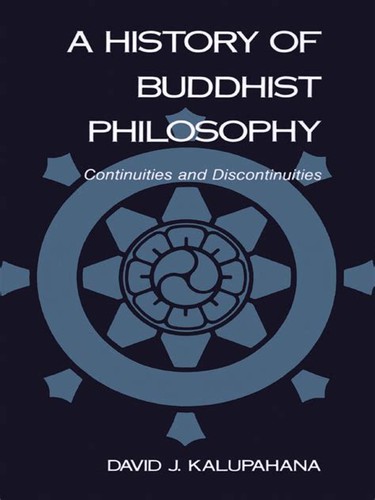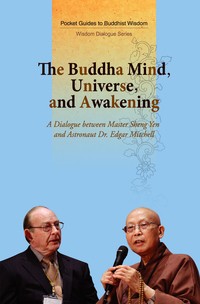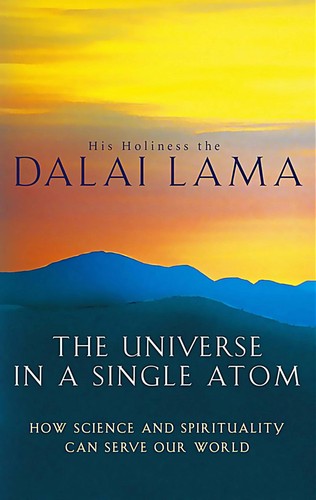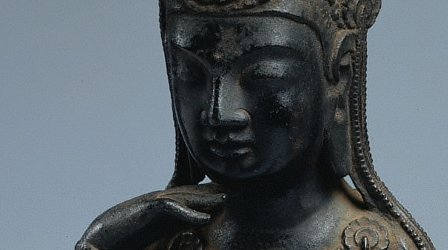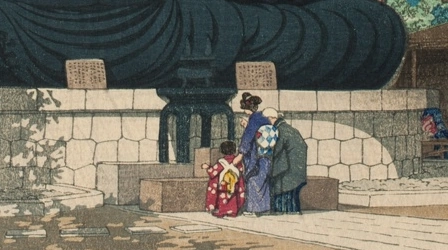Buddhist Philosophy in Dialogue
Subscribe to this topic via: RSS
How Buddhists have engaged in philosophical debates both among themselves and with others—across history and up to the present day.
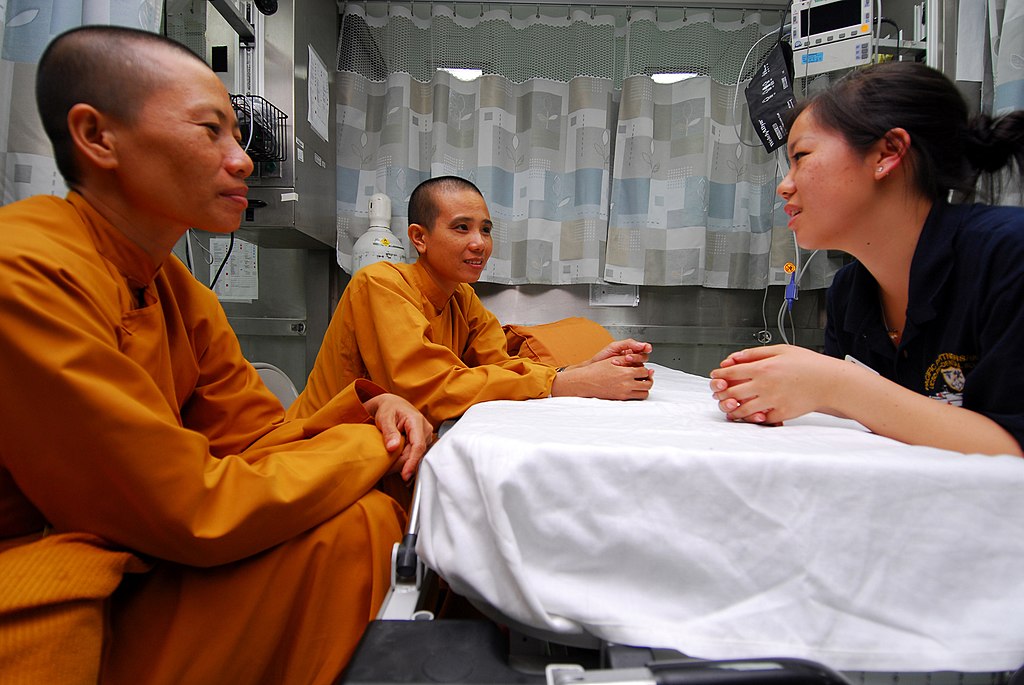
Two Buddhist monks and a Vietnamese-American dental student lean on a hospital bed chatting while they wait to see a doctor in 2010. (Eddie Harrison, Public domain)
Table of Contents
Books (23)
Featured:
-
⭐ Recommended304 pages
-
⭐ Recommended
-
264 pages[recommended but under copyright]
See also:
Canonical Works (34)
Featured:
-
I see some fervent mortifiers who takes it easy reborn in a place of loss. But I see another fervent mortifier who takes it easy reborn in a good place, a heavenly realm.
-
⭐ Recommended
I do not dispute with the world; rather, it is the world that disputes with me.
-
There is, brahmin, a sense in which you could rightly say that I’m a teacher of annihilationism. For I teach the annihilation of greed, hate, and delusion, and the many kinds of unskillful things.
-
… it is only here that there is the contemplative
-
‘What does your teacher say, what does he teach?’ Being asked thus, friends, you should answer: ‘Our teacher, friends, teaches the removal of desire and lust.’
-
‘This contemplative Gotama whom you praise is a nihilist, one who doesn’t declare anything.’
‘I tell you, venerable sirs, that the Blessed One righteously declares that “This is skillful.” He declares that “This is unskillful.”’ -
The Buddha draws out his interlocutor’s own wisdom to answer a tricky question.
-
… when a mendicant explains what is not the teaching as the teaching…
-
The Buddha refuses to say that there is no self.
See also:
Readings (86)
Featured:
-
⭐ Recommended
… dependent origination in early Buddhism was transmuted from a causal chain binding beings to samsara—something to get free from—into contemporary interpretations of interdependence as a web of interconnected beings and events to celebrate, embrace, and become one with.
-
⭐ Recommended
Unlike cadaver donation in the West, which has to a large degree maintained the anonymity of the body used to teach medical students, the Taiwanese Tzu Chi Buddhist Silent Mentor programme at the centre of this article foregrounds the identity of the training cadaver as an essential element of medical pedagogy
-
What is meant by its central philosophical concept of “absolute nothingness,” and how did the Kyoto School philosophers variously develop this Eastern inspired idea in dialogue and debate with Western thought and with one another?
-
one can speak of a mature philosophical system only when a coherent edifice of demonstration and argumentation has been perfected. In this sense, Buddhism has reached its maturity.
-
An excellent overview of the history of Indian Buddhist metaphysics from the perspective of the Tibetan (Mādhyamika) siddhānta literature.
-
… because I have discerned the teachings by perceiving my own mind, I feel respect for the tradition that bases itself on mind [i.e., Chan]. Moreover, because I have understood the cultivation of mind by discerning the teachings, I have reverent regard for the meaning of the teachings.
-
To deal with social dukkha, habitual tendencies rooted in the Three Poisons have to be identified and redressed in the constitutive social, cultural, and political environments too. In other words, Buddhist social theory recognizes that the manifestations of the Three Poisons are as much a matter of institutionalized, normative knowledge-practices as they are private, personal tendencies.
-
The Tathagata’s lion’s roar has content, and its content varies in the different suttas that contain the simile.
-
This study examines the phenomenon of borrowing and reusing portions of texts without attributing them to their ‘legitimate authors’ within the Buddhist world of contemporary Tibet. It shows that not only is such a practice not at all infrequent and is often socially accepted, but that it is used in this case as a platform to advance specific claims and promote an explicit agenda. Therefore, rather than considering these as instances of plagiarism, this essay looks at the practice of copying and borrowing as an exercise in intertextuality, intended as the faithful retransmission of ancient truths, and as an indication of the public domain of texts in Tibet.
-
Widely read as he was in Western philosophy, one of Nishida’s main concerns was to find possible points of contact between his own heritage and the philosophical background of the modern civilization that was taking shape in Japan during his lifetime.
-
The Kauṣītaki Upaniṣad employs the chariot imagery in the service of a unitary notion of, and perpetual correspondence between, the different particles of being that make up the different dimensions of a person. The particles of intelligence (prajñā) and the breath are all fastened together just as in a chariot the rim is fastened to the spokes and the spokes to the hub.
-
the ritual texts and proselytizing efforts of Jōkei 貞慶 (1155–1213), a prominent monk in the Hossō 法相 school of the early medieval era in Japan. I will seek to interpret his personal devotion and evangelism in the context of broader ideological clashes taking place. More specifically, this study will ask how we should make sense of Jōkei’s gradually evolving devotional allegiance to Kan-non 観音 in the last ten or so years of his life. I will contend that Kannon served as the perfect symbolic foil for Jōkei to counter the popular senju nenbutsu 専修 念仏 (exclusive practice of the nenbutsu) teachings expounded by Hōnen 法然 (1133–1212) and the threat it represented to established Buddhism in Japan.
-
Even as groups like the International Network of Engaged Buddhists are attempting to frame a unified Buddhist position on environmental issues, Buddhists in different places are interpreting and adapting Buddhist teachings in ways specific to and meaningful in each society. Can the efforts of Buddhists to develop and implement an environmental ethic or activism in one location be translated into other Buddhist societies?
-
Buddhism does, in fact, contain transcendence and mystery and it is quite capable of taking a seat at the open table of postmodern spirituality.
-
In this article, Bhikkhu Analayo looks at both the Chinese and Pāli versions of the Milindapañha, a classical Buddhist text that deals with the idea of no-self. Analayo begins by briefly discussing the basic principles of debate, followed by translations of both Chinese and Pali texts with his own comments at the end of each section.
-
For an important task of the Zen philosopher is to police the border between the factual and the non-factual, between the sayable and the non-sayable, between the contingent and the necessary. But this task cannot be reduced to just policing. The Zen master must somehow point the disciple to the realm of the non-sayable while at the same time keeping him or her firmly anchored in the sayable.
-
The Buddhist attitude to any such revelation would be that of accepting what is true, good and sound and rejecting what is false, evil and unsound after a dispassionate analysis of its contents without giving way to prejudice, hatred, fear or ignorance.
-
⭐ Recommended
The debate that we staged among the monks in our very last activity session about whether to edit the human genome was outstanding, and demonstrated how effective the monks are as thinkers once I had presented the underlying science and issues involved. And despite the fact that when they come to the West, they often seem very quiet and serious, in the monastery, they are very boisterous and willing to try anything.
-
Is the aim to have right view, or go beyond views; or is right view about not being attached to any view?
-
This essay first discusses the use of language in Buddhist epistemology, mainly from a Yogācāra perspective. The author then turns to a semiotic analysis of Buddhist symbols and metaphors as a means of producing knowledge of relative truth.
-
Conversation is a means of accomplishing many subtle and indirect things.
-
This work however introduces the ten transcendent perfections and eleven bhūmis on the basis of relative truth and, on the basis of the ultimate truth, explains how there is no arising even conventionally according to the four extremes. Thus, this commentary on the intent of the Middle Way includes several uncommon features not found in the works of other scholars.
See also:
Audio/Video (23)
Featured:
-
It’s easy to think of Emptiness as the “right” view in an ontological sense. What the sutra is saying is that there isn’t a “right” way to characterize reality. “Thusness” is ineffable. So, Emptiness is not so much the “right” characterization as it is the remedy to our tendency to reify things into essences.
2h 12 m -
Tuning in, meditatively, all these things can loosen up. And it’s the loosening that’s the main thing.
1h 29 m -
What does it mean to meditate on anger?
1h 13 m -
Creativity is a human exercise that is only possible when we are free.
68 min -
⭐ Recommended
On holding ontologies loosely more as communication tools than as arbiters of reality.
See also:
